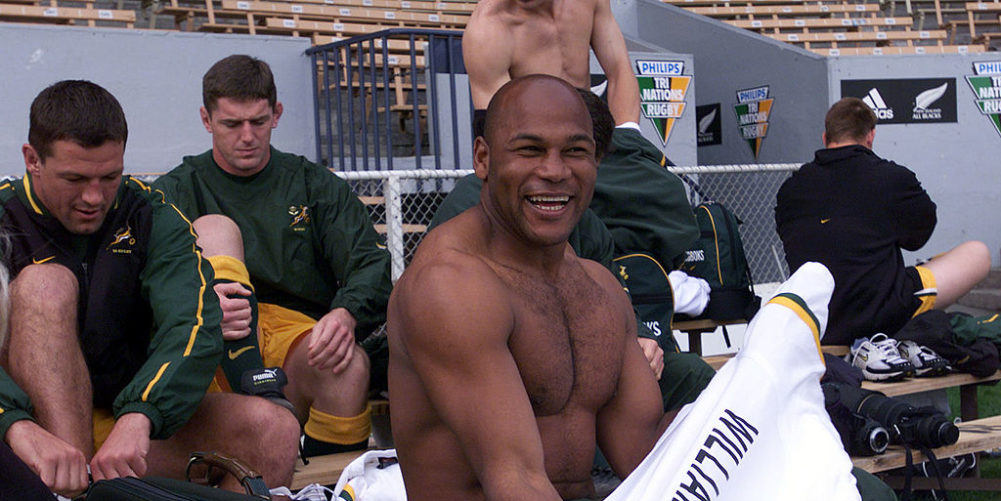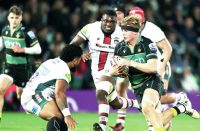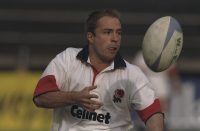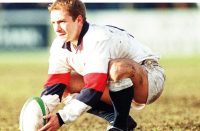Good grief the years have not been kind to South Africa’s celebrated World Cup-winning team of 1995. Coach Kitch Christie died just a few years after that memorable day in June 1995 while others, alas, have followed, at an alarming rate.
Flanker Ruben Kruger died from a brain tumour, scrum-half Joost van der Westhuizen succumbed to MND, wing James Small was lost to a heart attack recently and now fellow wing Chester Williams died on Friday aged 49. All taken way before their time.
The passing of Williams is particularly poignant for anybody lucky enough to be in South Africa for the 1995 World Cup. When you landed at Johannesburg airport and got a taxi into town the first thing you saw was a huge bill board the size of an eight-storey tower block with Williams’ smiling countenance beaming down welcoming you. Smaller versions were to be seen at every World Cup venue and airport.
Williams was the posterboy for RWC1995 in the most literal sense yet sadly by the time the fans and world’s media started to arrive in South Africa he was out of the tournament, the victim of an untimely hamstring strain in training. The one person of colour in the South Africa team would not be representing the Rainbow Nation. It was an inauspicious start both for the team and for those who had realised that this World Cup had the potential of transcending rugby and sport.
What happened next is possibly the central chapter of the larger fairy-tale that transpired. As an employee of the Western Province Union, Williams was immediately pressed into service by the South African organising committee – it was all hands to the pumps – and on the opening day of the tournament found himself as the waterboy and general gofer for Australia in their Pool opener against the Boks, an extraordinary state of affairs if you think about it but for some reason we didn’t think it particularly odd back then. Strange things happened on a daily basis at RWC1995.
But fate was to take a hand. The Boks found themselves in a vicious slug fest of a Pool game against Canada and when the dust had settled, wing Pieter Hendriks was among those who found himself cited and banned although he had escaped dismissal on the night. Suddenly there was a vacancy on the wing.
Cue a glorious return to action for a fit-again Williams, a pivotal moment in the rugby miracle that was beginning to unfold. The Boks had been playing under the one- team-one-nation banner but now, unexpectedly, the country finally had a player and hero of colour to cheer and rally round.
Williams seemed inspired by the moment and zipped in for four tries in the quarter-final against Samoa with that distinctive running style of his. Some people’s legs go up and down like pistons when they run, Williams legs whirred round and round like a cyclist riding a bike in a very low gear at a spinning session.
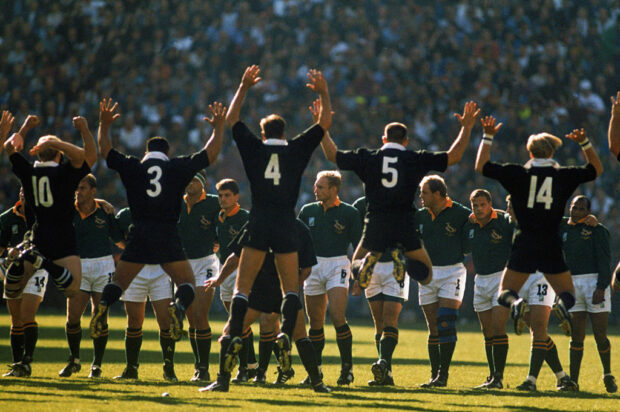
The diminutive wing went on to play his full part in both South Africa’s semi-final and final wins and was singled out for a special word when President Mandela went down the line-ups before the game. Afterwards all seemed well with the world, but in truth it was a short if glorious moment of contentment and fulfilment. Williams’ life was not easy either before or after the World Cup.
On retiring in 2001 he coached the Blitzboks, South Africa’s Sevens team, and helped the Uganda and Tunisia national teams. It was a bit of a struggle generally with periods of depression and a divorce from his childhood sweetheart Theresa.
In a hard hitting autobiography in 2002 Williams claimed everything he had achieved had been in spite of the system. Throughout his career he had endured racial abuse, sometimes overt and insulting, sometimes subtle and demoralising.
He insisted that his World Cup colleague Small – whose precocious performance at a schoolboy trial inspired the young Williams to take the game seriously – called him a f****** kaffir on the pitch and shunned him throughout his career.
Springbok mealtimes became a minefield, certainly during his early days in the squad. Williams and other black South African players dreaded arriving early and having to choose a table first. They would sit there humiliated, waiting in vain for a white player to join them. There were apparently notable exceptions – Gary Teichmann, Rassie Erasmus, Werner Swanepoel – but the black players could not spend their lives hovering around the restaurant entrance waiting for one of that trio to appear to ease their embarrassment.
By the end of his playing career, however, Williams had also grown to detest the quota system which at the time required Springbok and provincial sides to nominate a minimum of three players of colour in their squads of 22. On the Springbok tour of Britain and Ireland in 2000, coach Harry Viljoen bluntly told Williams he was finished as an international player after the Ireland Test, yet needed him on the bench against England to fulfil the quota. His humiliation was complete.
“I found it degrading to be put on the bench just to make up the quota, as was the case against England,” recalled Williams. “I would much rather have been dropped altogether, that would be much more honest.”
Williams, in retrospect, also grew to object to the way his image was used to promote and validate South African rugby: “I was definitely not a product of any enlightened developmental system put in place to help black and coloured players. No way. I did it the hard way. I fought my way up through the ‘white’ system on merit. I was a rugby player, pure and simple, that is my story.”
Underpinning his struggle at all times was an incident in his childhood days and his hero worship of Wilmot, his older and more talented brother who died of meningitis, aged 21. Like most older brothers he affected to take little interest in his younger sibling, but one day Chester saw a piece of paper on top of Wilmot’s school satchel. He sneaked a look. The jotting, alongside Wilmot’s maths homework, simply said: “Chester is the best centre, one day he will become a Springbok.”
Did he ever.

